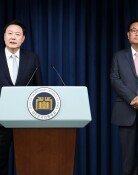Japan was never an inferior country
The year is that of Imjin. Based on gapja, or a cycle of 60 years, the Joseon (Korean)-Japanese War, which began with Japan`s invasion of Koreas ancient kingdom Joseon, occurred seven gapjas ago (in the gapja year of 420). The war broke out April 13, 1592. Just 20 days after the invasion, Japan captured Joseons capital and occupied all Joseon territory for seven years excluding the Jeolla and part of the Pyongan provinces. The Joseon people at the time suffered trauma from the war because of the serious hurt inflicted on them by the small island country they had looked down on.
The problem is that Koreans today continue to be misinformed about Japan even after the war. They criticize their ancestors from the Joseon Dynasty for failing to prevent the war due to lack of understanding of Japans capability and political situation at the time. Koreans are well aware that Japans territory and population are bigger than those of Korea, but believe that Japan turned into an economic powerhouse after the Meiji Restoration. For Koreans, Japan in the past was a weak country whose culture lagged far behind Korea`s.
This is an illusion, however. At the time of the war, Japan was the worlds most powerful country in military capability. It had more than 500,000 matchlocks at the time, more than the combined number of firearms that European countries had. Japan`s regular troops with strong fighting power numbered 300,000, with just half of them deployed to the war. By contrast, Joseon had only 50,000 to 60,000 regular soldiers. While Joseons population was under 10 million, that of Japan reached almost 20 million. Japan overtook Korea in population in the unified Shilla era.
The gap between Korea and Japan further widened after the war. After shogun Tokugawa Ieyasu took power, the Japanese capital of Edo (old Tokyo) became the worlds largest city with a population of one million in the 18th century. Beijing and Paris had just 500,000 people each, London 800,000, and Joseons capital of Hanyang just 300,000. Through kabuki, the classical Japanese dance-drama, Japan invented the worlds first revolving state and first fastfood soba and sushi. Koreans understandably seek to soothe their bruised egos, but should also refrain from unnecessarily disparaging Japan.
Assistant Culture Editor Kwon Jae-hyeon (confetti@donga.com)
Headline News
- Med professors announce intention to leave hospitals starting Thursday
- Bridge honoring Sgt. Moon Jae-sik unveiled in Pennsylvania
- Chief of Staff Chung tells presidential secretaries to stay away from politics
- US FTC bans noncompete agreements
- N. Korea launches cyberattacks on S. Korea's defense companies







